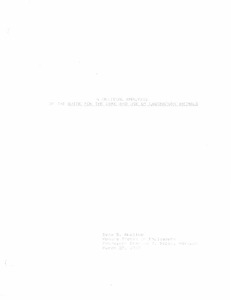A Critical Analysis of the Guide for the Care and Use of Laboratory Animals
Author
Anstine, Dana Suzanna
Subject
Washington and Lee University -- Honors in Philosophy
Animal welfare
Laboratory animals
Metadata
Show full item recordDescription
The Guide for the Care and Use of Laboratory Animals, prepared by the National Institutes of Health, provides an interpretation of the Animal Welfare Act. The Guide is the most stringent of the regulatory documents concerning animal welfare. Because the guide provides the clearest and most humane guidelines and is willing to adopt changes to become a more efficient document, I believe that it has the most potential to incorporate within it the policies of humane stewardship. Animals and humans share many characteristics such as the abilities to perceive through the senses, and experience pain. In fact, as Kant suggested, animals and humans hold so many traits in common that one can transpose the way one treats one group to the way one treats the other. Kant wrote, "tender feelings towards dumb animals develop humane feelings towards mankind" (Regan and Singer 1976, 123). The "formal principle of justice" asserts that it is impermissible to treat those who are not different differently. Although humans differ from animals in some respects, as they generally possess characteristics that allow them to function as moral agents, humans do extend moral consideration to members of the human community that do not possess these distinguishing characteristics (such as infants and the comatose) as a result of the recognition of the similarities between these humans and ourselves. Though these humans lack the ability to act as moral agents, we (who can act as moral agents still extend moral consideration to them. Since humans can also recognize that animals possess similar characteristics, it follows through the application of the formal principle of justice, that humans should provide moral consideration for animals based upon the degree of similarity between the species of animal and humans. I believe that this moral consideration should be manifested in the form of humane stewardship and not in the form of animal rights. I believe that one must be able to act as a moral agent to have rights and that non-humans currently cannot act as moral agents. The implementation of humane stewardship involves "respectful" treatment of animals. By respectful treatment, I mean that animals should be treated with care and that the lives of animals should not be taken or treated lightly. Animals should be used only to fulfill needs. Most researchers believe that no alternative exists for the use of animals in investigational purposes. As research is needed it ought to be carried out in accordance with humane stewardship. The Guide does not attain adequate guidance compared to the standard of humane stewardship. To achieve the level of guidance necessary, the Guide would need to implement several kinds of changes. It needs to provide more effective enforcement and motivation for researchers to comply with its recommendations. Research should be conducted to determine the appropriate conditions for each species; the new findings should be incorporated in the Guide. Finally, as it depends extensively upon the moral beliefs and ethical integrity of the individual investigator, it should assimilate a stronger expression of concern for animals. As a result of such changes, compliance with the Guide will foster humane stewardship.
